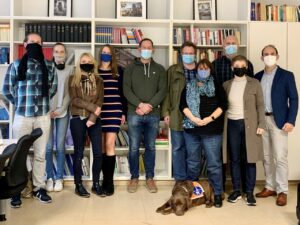Design workshop to promote the development and testing of accessible software
In the iDESkmu project (including document management systems and enterprise content management systems in medium-sized companies; website www.projekt-ideskmu.de) we want to promote the availability of barrier-free software and raise awareness of its necessity.
An important milestone for this goal is to make the creation and testing of barrier-free software as easy as possible, even for people without expert knowledge. To this end, the University of Siegen and the project partners organized a design workshop in October and discussed with the future target groups what is necessary to simplify accessibility tests.
Blind and visually impaired employees took part in the workshop, who explained to us in detail the greatest difficulties in dealing with software products and also brought a lot of experience from acquaintances. There were also developers and quality managers who showed us working methods from their point of view and how they can imagine simple tool support in their work. The entrepreneurial interest also became clear again through aa freelancer, so that in this round the various requirements and perspectives could be specifically discussed in order to finally define consolidated requirements for a “test tool for the accessibility of software”.
The design workshop, led by the University of Siegen, was supported by two project partners who are developers and experts in accessibility.
The requirements for such a test tool are not only demanding in terms of content, but also technically, which in our opinion also makes it clear that the subject of accessibility for non-specialists and support in this area in general is difficult to understand and urgently needs support.
Recurring difficulties with keyboard operation, focus tracking and color delimitation are part of the daily challenges for blind and visually impaired people not only in the work context. In contrast, developers and companies wanted automated or at least partially automated test options in order not to invest too much time in the tests or not to slow down the development of valuable functions despite the desire for accessible software.
In summary, the cooperation with the various actors was a success, which was expressed in a lively exchange with well-founded arguments and which later ended in a common consensus.
Only the time required for this was underestimated. There were numerous things among the various parties that the others were not even aware of. This has encouraged us in our project work to create additional modules such as information and training material.
In addition, everyone found the meeting and the mutual exchange to be so valuable and fruitful that ideas for further cooperation arose not only during the development of the test tool.
We are very pleased that everyone involved helped so constructively to make this first exchange so successful and would like to thank you once again.
Your iDESkmu team from the University of Siegen
Sven Bittenbinder & Fabiano Pinatti
|
Sven Bittenbinder Room: US-E 117 (Campus Unteres Schloss) Phone: 0271 740 – 4470 E-Mail: sven.bittenbinder@uni-siegen.de |
Dr. Fabiano Pinatti Room: US-E 114 (Campus Unteres Schloss) Phone: 0271 740 – 2002 E-Mail: fabiano.pinatti@uni-siegen.de |

Participants in the design workshop (from left): Sven Bittenbinder, Eva Krapp, Johanna, Bergmann, Julia Schnittker, Jörg Völkel, Patrick Bloy, Katrin Spies-Gußmann (zusammen mit Blindenhund Lilly), Christoph Strumann, Nadia David, Fabiano Pinatti. Online participant: Rainer Wallbruch.



